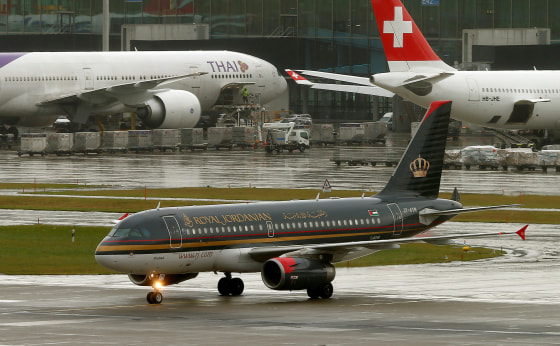The new electronic device cabin restrictions on certain flights inbound to the United States from 10 overseas airports in the Muslim world were not prompted by a specific, newly-discovered threat, multiple U.S. officials told NBC News.
The U.S. move stemmed, American officials said, from an evolving judgment call that al Qaeda and ISIS are constantly seeking to perfect methods to hide bombs in devices. The U.S. is continually gathering new intelligence about that effort, the officials said.
Related: U.S. Restricts Laptops, iPads in Carry-On Bags From 10 Airports
"This is something they could have decided to do last month, or never," one U.S. official said. "There is no new critical piece of intelligence, but at the same time there are bad people trying to do bad things."
The officials stressed that career intelligence and security professionals have assessed that the threat is significant.
“If I were flying from Cairo to JFK today, I would be all on board with this plan,” said one American official briefed on the intelligence.
The 10 overseas airports on the U.S. list were selected "because of the infrastructure and security apparatus they have in place,” said an American official briefed on the intelligence. Their security screening is less rigorous than that found in airports in Europe and the U.S., the official added.
Hina Shamsi, director of the ACLU's National Security Project, said in an email to NBC News that the administration "hasn’t provided a security rationale that makes sense," adding that "this policy sends a signal of discriminatory targeting and must be heavily scrutinized.”
But Rep. Adam Schiff, the ranking Democrat on the House intelligence committee, said he concluded the new policy was justified after he was briefed over the weekend on the classified intelligence.
"These steps are both necessary and proportional to the threat," Schiff said. "We know that terrorist organizations want to bring down aircraft and have continued to employ creative ways to try and outsmart detection methods. The global aviation system remains a top target and proper security requires that we continually adapt our defenses."
At least some element of the general threat points back to al Qaeda in the Arabian Peninsula and its master bomb-maker, Ibrahim al-Asiri, two of the officials said. Al-Asiri, who is believed responsible for two bombs hidden in U.S.-bound cargo planes in 2010, is believed to have taught others some of his techniques, they added. The cargo plane bombs were discovered before they could go off.
The U.S. gave nine airlines until Saturday morning to make sure that passengers on flights from 10 overseas airports aren't carrying any electronic devices larger than smartphones with them.
A senior Trump administration official said the airlines are being given 96 hours to fully implement the rules, starting 3 a.m. ET Tuesday, because "evaluated intelligence indicates that terror groups continue to target aviation, to include smuggling explosives in electronic devices."
The outlines of the new policy were revealed Monday when Royal Jordanian Airlines "jumped the gun" and sent an advisory to passengers, a U.S. official told NBC News.
Officials said devices like tablets, cameras, laptops, portable DVD players, e-readers, portable printers and scanners, and video games will have to be placed in checked baggage under the new policy, but medical devices will be permitted. The restrictions won't affect crew members.
The policy covers about 50 direct daily flights into the United States from nine airlines flying from 10 overseas airports.
Click Here To See a List of the Airlines and Airports
Officials wouldn't say how long the restrictions will be in place.
The British government announced Wednesday that it was implementing similar rules on flights coming from six Muslim majority countries.
"The safety and security of the traveling public is our highest priority," a British government spokesman said in a statement. "That is why we keep our aviation security under constant review and put in place measures we believe are necessary, effective and proportionate."

